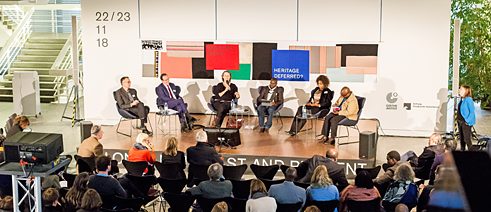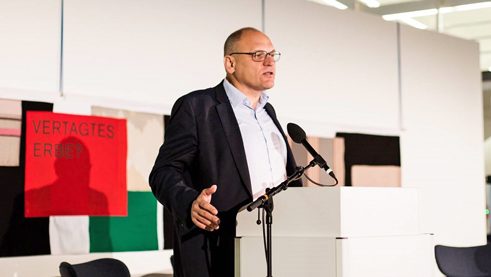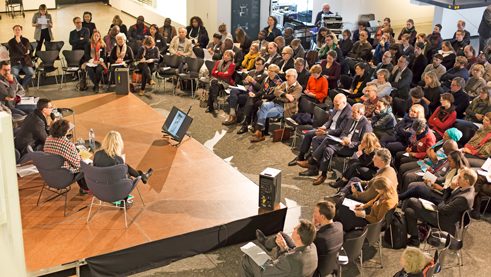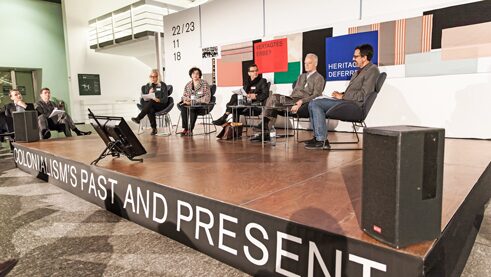Heritage Deferred
Museum Subjects

How to deal with colonial heritage? In Berlin, the international conference Heritage Deferred? held by the Goethe-Institut and the Prussian Cultural Heritage Foundation examined colonialism’s past and present.
On Friday, [23 November 2018,] the Senegalese economist Felwine Sarr and French art historian Bénédicte Savoy presented French President Emmanuel Macron with their report on the Restitution of African Cultural Heritage. As expected, their 252-page report recommends the swift return of stolen art from French museums to the countries of origin. Macron then decided to hand 26 objects over to Benin that French soldiers had plundered in 1892 from the property of the King of Dahomey, whose wealth was based on the slave trade.
When the report was published on Friday evening, a two-day international symposium by the Goethe-Institut and the Prussian Cultural Heritage Foundation (SPK) had just ended at the Ethnological Museum in Berlin-Dahlem. There, scientists and museum people from Egypt, Australia, Brazil, China, Germany, Fiji, the United Kingdom, Namibia, Colombia, and the US had discussed the complex and emotionally charged topic of the colonial era and its consequences with activists in the audience. Heritage Deferred? was the title of the conference devoted to colonialism’s past and present based on artefacts, but also on human remains in European collections. It thus took a look at what Sarr and Savoy summarised in a formula: European museums had unintentionally become the public archives of a system of appropriation and alienation – the colonial system. Nzila Marina Mubusisi, the leading curator of the Namibian National Museum, used an anecdote to illustrate how present the colonial past can be when one looks at an archive. Jonathan Fine, curator of the collections from West Africa, Cameroon, and Gabon at the Ethnological Museum in Berlin and curator of the conference with Stefanie Peter of the Goethe-Institut, had led a tour through the ethnological collection. In its inventories Mubusisi made a discovery: The Berlin collection also contains an object from the village of her grandparents.
 Johannes Ebert, Secretary General of the Goethe-Institut, talks about the need for open dialogue
| Photo: Viktoria Tomaschko
Johannes Ebert, Secretary General of the Goethe-Institut, talks about the need for open dialogue
| Photo: Viktoria Tomaschko
Who gives back to whom?
Mubusisi also sat on the stage with Thomas Schnalke who, as director of the Charité Medical History Museum, initiated the return of twenty human skulls of the Nama and Herero from the Charité's former anatomical collection to Namibia. The Charité estimates that there are approximately 7,000 human skulls in German collections.Material evidence
Marina Mubusisi reported that the skulls were shown for a day in the garden of the Namibian Parliament to give members of the two communities the opportunity to pay their respects to the dead. The representatives of the Nama and Herero then decided that the skulls should be kept in the museum as material evidence of the crimes of the German colonial regime, but should not be displayed. Raphael Gross, the director of the German Historical Museum, spoke of Alexander von Humboldt, who had also brought back human remains from South America. It is forbidden to show these human remains in the museum, Gross said. To the amazement of the panel, he then mentioned that not all responsible people agree with him in this. Moderator Larissa Förster noted that she had assumed everyone now generally agreed on this issue at least. How to deal with colonial heritage? Panel at the conference Heritage Deferred?
| Photo: Viktoria Tomaschko
How to deal with colonial heritage? Panel at the conference Heritage Deferred?
| Photo: Viktoria Tomaschko
Surveying the world
So even in 2018, people are still arguing over such matters of course. With regard to the Humboldts’ veneration in Germany, Gross pointed out that “surveying the world” was also the beginning of the measurement of skulls and bones, which soon became one of the chief methods used by German race researchers. Skulls are not museum objects but subjects, added Thomas Schnalke. This definition would also have to apply to other collection objects, it was emphasised several times. For what a European curator may see as a carved stone from a tomb, may represent an ancestor to a relative and is considered part of the family. The Namibian archaeologist Goodman Gwasira therefore called for the decolonisation of scientific methodologies. He used native trackers to analyse the footprints found alongside paintings of elephants and shamans in a Namibian mountainous region. They could provide valuable clues as to the possible age and sex the makers of the footprints.New forms of usage rights
Although everyone agreed that the recognition of colonial crimes must be the basis of museum work today, there was no consensus on how to deal with the sometimes vehemently demanded return of objects. The circumstances are often extremely different. And the question of who owns artefacts is also often disputed in the countries of origin. This problem may only be solved if new forms of usage rights are negotiated. The British historian Richard Drayton pointed out that medieval legal systems in Europe derived property from God, which allowed them to define usage rights that go beyond purely individual property rights. Perhaps it is time to develop new forms of social property. This is likely to be more difficult than demanding immediate return, but it meets the target set by Shuzhong He of the National Heritage Administration of the People’s Republic of China: Although illegally purchased objects must be restituted, the negotiations should be understood as an opportunity for new cooperation. For cultural heritage should promote the mutual understanding of cultures and is a creative source for the future. Experts discuss colonialism’s past and present
| Photo: Viktoria Tomaschko
The unabridged article by Ulrich Gutmaier was published on 25 November 2018 in the taz.
Experts discuss colonialism’s past and present
| Photo: Viktoria Tomaschko
The unabridged article by Ulrich Gutmaier was published on 25 November 2018 in the taz.